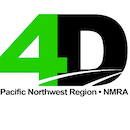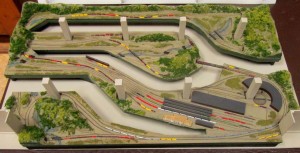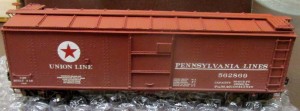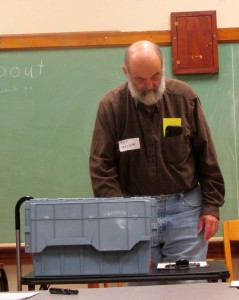Roger Johnson
The Mt. Vernon NMRA Clinics got off to a great start with 21 attendees, including several dignitaries from “down South:” PNR President Mike Highsmith, Ed and Ken Liesse, Bob Rohrbach, and Sherman Stevens. Such an honor to have them at our first clinic!
A “Show And Tell” segment included models from Nick Muff, Al Carter, Ted Becker, Mike Pettruzzelli, Roger Johnson, and Paul Koren. This is not a competition, but is designed to get folks to share their modeling projects and techniques and, in the process, hopefully discover new clinicians. Please see the photos below.
Ted Becker had the honor of being our first clinician, with his “How To Hobby Shop Outside The Hobby Shop” program. Ted has a great eye when it comes to recognizing items from sources other than the traditional hobby shop that we model railroaders can use. He came with what seemed like a bottomless box out of which he pulled a plethora of tools, supplies and ideas.
Among His Hints
- Use 3M Brand #218 masking tape (available at auto paint supply stores) for masking models. It makes a very clean edge and the narrower tape curves easily.
- Use MEK (methyl-ethyl-ketone) available from hardware stores as an adhesive for styrene.
- Other hardware store finds
- Acrylic caulk (non silicone!) for gluing down track to cork roadbed
- Pliobond glue or Barge Cement – use like Walther’s Goo
- Water based contact cement – great for adhering cork roadbed to wood sub roadbed.
- Steel wool dissolved in vinegar makes a nice “brew” with which to stain strip wood.
- A silicone BBQ basting brush for use in “painting” plaster and such, easily cleaned after use.
- From the craft store
- Craft sticks
- Craft paint (when thinning, add the thinner in small increments and stir thoroughly)
- Clothespins for clamps, including miniature clothespins
- Decorative sand (black makes great coal and cinders)
- From the “Dollar Store”
- Spray bottles
- Brushes
- Storage boxes
- Make-up brushes (for dusting models, and also for applying weathering powders)
- Shot glasses (used inverted to put a small puddle of glue in which to dip toothpicks, etc)
Other hints included visiting Harbor Freight for needle files, heat shrink tubing assortments, and miniature vacuum hoses (to attach to a shop vacuum). From Grizzly Tools, Ted found a great digital caliper measuring both inches and metric and small 4” Jorgensen clamps.
The bottom line: keep your eyes open when shopping and you’ll be surprised what you find that can help you in your modeling efforts.
The next clinic is October 28 when Tom Buckingham will show “up close and personal” photos of his recent trip to Germany and Miniature Wonderland, that fantastic layout we’ve all seen in the model magazines. Then, on November 25, Nick Muff will show us how to do geodesic foam rocks and landforms.




No Comments Yet